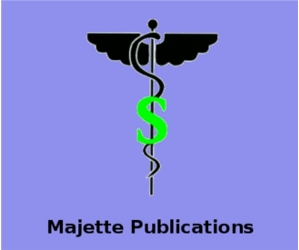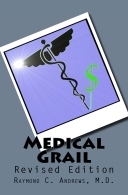
Back Contact Us Home
Do you remember when you were a child and your parents called old Doc Jones in the middle of the night because they thought you were seriously ill? If you are a young adult you probably don't. Doctors stopped making house calls years ago. If you're older, you might recall he arrived at your home, unshaven and grumpy because of the hour. His appearance and gruff manner might have frightened you, but when he gently rested his hand on your belly, your pain and fear disappeared as if by magic.
When your parents asked him how much they owed him for the visit, you might have heard him answer, "Pay me when you get my bill." You might not have known your father was out of work, but he did, and he never sent his bill.
Today the Doc Joneses in America are almost extinct. A new breed of practitioner has taken their place: the businessman-physician. If you call him in the middle of the night because your child is ill, he will send you to your local emergency room, even though he knows services there will cost thousands of dollars and the ER doctor will order many more tests than he would to diagnose your child's illness.
This scene is replayed thousands of times a day across the country, but if you know how the medical system works, you can still find a "Doc Jones" and avoid the financial and physical risks associated with today's treadmill-style medical care.
Historically doctors cured few diseases and despaired of stemming the plagues that devastated past civilizations. Through persistence and serendipity, they learned the body's most formidable enemies come not from within, but lie in ambush in its environment. These invisible killers include the typhoid fever and hepatitis microbes that contaminate our drinking water, the malaria carrying mosquitoes that live in swampy terrain, and the germs teeming in the excrement collecting in uncovered trenches outside shanty houses.
After centuries of trial and error they realized they could prevent these diseases by simply purifying drinking water, draining swamps, and installing underground sewerage.
Because of today's public health measures, people now enjoy a life span few attained in earlier times. These measures defeated his environment's attempts to shorten his existence, which now easily exceeds one hundred years.
Today space-age machines, such as Computerized Tomography Scanners and Magnetic Resonance Imagers, monitor and measure your health in ways never dreamed of by early doctors. Unfortunately with their introduction came the businessman-physician who relies more on what they tell him than on what you tell him. The reason is obvious: talking with you is a better and safer way to arrive at the diagnosis of your disease than sending you off to have tests done, but it take time and is less profitable.
In the introduction to the 1979 Surgeon General's report Healthy People. Secretary of Health, Education, and Welfare, Joseph Califano declared, "You, the individual, can do more for your own health and well-being than any doctor, any hospital, any drugs, (and) any exotic medical device."
I would add that any doctor, any hospital, many drugs and exotic medical devices can do more damage to your health in a day than you could undo in one lifetime, even with the help of the best lawyers in the land.
Despite the first dictum of the Hippocratic Oath, primum non nocere "first do no harm," many doctors order a battery of laboratory examinations, regardless of their need or danger, before they can diagnosis even the simplest disease. They call this "defensive medicine," and foolishly believe their patients will not sue them for malpractice if they "perform all the tests."
Competent doctors can easily and inexpensively diagnose your disease at your first visit, and no patient doctor has ever sued his doctor because he correctly diagnosed his disease without ordering laboratory tests. Patients sue when their surgeon removes the wrong leg and not because he did not order a test for malaria.
A second, less ethical reason doctors order unnecessary testing, is luxury automobiles and alimony payments. These and similar excuses encourage them to do as much as possible to you before you recover from your illness on your own, which you will do most of the time.
This increases their earnings as it increases your medical costs, as well as the possibility of permanent injury or death from risky or unnecessary procedures.
This book is the result of years of learning, teaching and the knowledge the human body is self-repairing and will last many years despite the abuses you heap on it. When it does break down, you should not simply hand over its repairs to anyone bearing a title, no matter how fanciful it may be, without actively taking part in the decision-making.
HOW TO BE A PATIENT AND LIVE TO TELL THE TALE! will teach you how to use today's medical system to arrive at the correct diagnosis of your illness or injury while avoiding unnecessary laboratory testing, unwarranted surgical and medical procedures, and dangerous medications before they damage your health or drain your budget.
We will eventually have a health problem that will need a doctor to resolve. Before you knock on his door, you'll want to know is he is competent and honest and will do his best to resolve your problem quickly and inexpensively, or if he is inept and greedy and will order tests or procedure just to boost his bank deposits. You'll also want to know if he'll prescribe a proven, safe therapy or a new, expensive, and possibly dangerous medication because a drug salesman promised him he would "win" a cruise to the Bahamas if he met a quota.
This book will help you find the Doc Jones in your area. It cannot guarantee you will survive your illness, but it will help you understand what your doctor, pharmacist, and hospital are doing to you, show you how education and skepticism can help you avoid the travails of medical science, and teach you how to make modern medicine work in your favor.
Some of the material in this book may seem unimportant if you receive your care from HMOs or similar organizations. Ironically your risk is not over-treatment, but undertreatment. Doctors who work for those organizations may deny you care because it is expensive and their cost-conscious program administrators will not approve it.
You should use the information in this book not only to avoid improper care, but also to make sure you receive the correct therapy when you need it.
I do not believe managed care is the solution to our health care woes, especially since it has moved the profits from doctors' pockets to those of the CEOs. The less of your money they spend on you, the more they keep for themselves.
Even though it will never happen, I believe if patients paid their own bills, medical costs would plummet for the following reasons:
-
Patients with minor complaints would stay out of doctor's offices, emergency rooms and hospitals.
-
Patients would shop for their doctors, choosing the most honest, competent, and reasonably priced. Incompetent doctors would be forced out of practice and dedicated doctors would again treat the indigent for free.
-
Multi-thousand dollar surgical fees would stop because no one would pay them. Surgeons could sue their patients to collect their excessive fees, but would more likely lower them if they wanted to stay in business.
-
Unnecessary laboratory and other medical costs would plummet for the reasons above.
-
Hospitals would become more competitive since they would have fewer patients. Those who needed admission would have checked their costs beforehand, avoiding the more expensive ones. Expensive care is not superior to inexpensive care, especially since each must follow the same legal and moral guidelines.
Until such a radical idea becomes a reality, you need to understand how the medical system works to safeguard your health and pocketbook.



